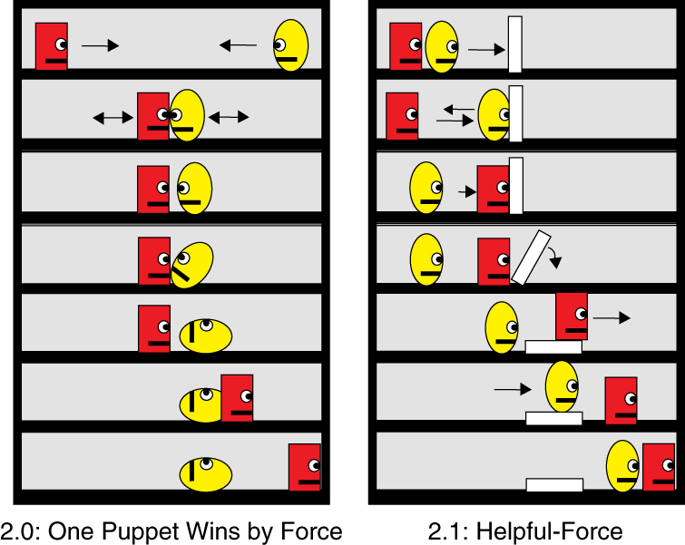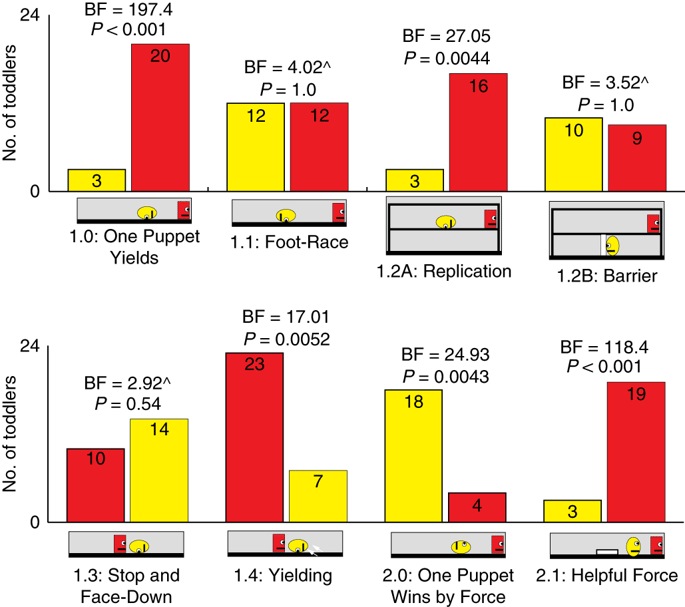
It is a universal truth that humans are social animals. Humans necessarily exist in societies complete with norms of behavior, hierarchies, and moral rules. Part of living in a society involves responding to cues of social status. Social status plays a role in the survival of a number of organisms, including humans, chimps, wolves, bees, and even lobsters. Having a higher social status in a hierarchy means having more access to food, resources, and mates. Consequently, individuals who can recognize a high social status are more in a position to reap the benefits of these advantages.
A new study published in Nature seems to indicate that a sensitivity to social status is inherent in toddlers younger than 31 months old. In the study, a team of researchers from Aarhus University in Denmark and the University of California-Irvine demonstrated that human toddlers showed high levels of affinity towards those who “fairly” win a confrontation, and are naturally averse to those who use force to win. The researcher simulated a “right-of-way” conflict with puppets, one scenario in which a puppet “won” because the other yielded out of the way, and another scenario where a puppet “won” by knocking over the other puppet. In the case where the puppet won fairly, 20 out of 23 toddlers showed an inclination to reach for the puppet who won, but 18 out of 23 toddlers were initially drawn to the “loser” in the scenario where the puppet used force.
Such a study adds to the list of evidence that human beings both seem “hardwired” to navigate social hierarchies based on ascriptions of social status and are naturally inclined to those who achieve status by means other than force.
Dominance/Prestige Hierarchies
The hierarchies found in social animals can be divided into two main types: dominance and prestige-based hierarchies. In dominance based hierarchies, such as those found a number of non-human primates, social status is mainly a function of an individual’s ability to inflict physical harm on others. The status as the dominant individual is secured mainly through physical force and intimidation.
In contrast, humans seem to operate on a prestige based hierarchy, in which social status is bestowed upon individuals in virtue of their ability to provide benefits like protection, resources, or “cultural “know-how.” It seems that, from the perspective of social evolution, humans have come to recognize the truth of the old proverb “you can catch more flies with honey than vinegar.” Of course, no individual species operates on an exclusively dominance or prestige based hierarchy, but a mixture of the two in differing proportions.
One particular interaction found in social hierarchies that is an indicator of how groups bestow social status is in the form of zero-sum conflicts where the conflict is resolved by one individual yielding to another. In species that operate on dominance-based hierarchies, low-status individuals will yield to high-status individuals to avoid getting hurt. Prestige-based hierarchies also show this kind of deference to those who are socially dominant, but the deference is not motivated by an aversion to physical pain but by a desire to maintain a close relationship with the dominant individual to gain access to the benefits they provide.
There is a wide amount of evidence that young children are competent in determining another’s relative social status and acting accordingly. Older and larger toddlers expect younger and smaller toddler to yield to them, and toddlers expect one who lost a zero-sum encounter to continue losing in the future. The current study is meant to measure how exactly children react to those who are socially less dominant: in particular whether they prefer to approach the one who yielded or the one who won the encounter.
In the study, the researchers took a sample group of toddlers 21-31 months old and examined how they reacted when presented with two zero-sum scenarios. In one scenario, two puppets approach each other going in opposite directions. After an initial struggle, one puppet “yields” by turning away and letting the other pass.

A diagram showing the set up of the “force” puppet scenario (left) and a subsequent control experiment where the two puppets used force together to pass an obstacle (right). Source: Thomas, A.; et. al. (2018) “Toddlers prefer those who win but not when they win by force” Nature <https://doi.org/10.1038/s41562-018-0415-3>
In the second scenario, the puppets begin to move as they did in the first. However, this time, instead of one puppet turning away and letting the other pass, the puppet knocks the other over in a display of force and continues on their way. This is the “force” scenario. After viewing each scenario 3 times, a confederate who did not know which puppet had yielded or which used force asked the children to pick which puppet the preferred.
In the “yield” scenario, 20 out of 23 of the children picked the puppet that continued down the path as the preferred one, indicating that they had a preference for the socially dominant individual. For the “force” scenario, 18 out of the 22 toddlers who participated reached for the puppet who had been knocked over, rather than the puppet who won by the use of coercive force. The researchers run subsequent replications and manipulations on both scenarios to mitigate the effects of any confounding variables.

The weighted results from the different scenarios and the subsequent manipulations. Source: Thomas, A.; et. al. (2018). “Toddlers prefer those who win but not when they win by force” Nature. <https://doi.org/10.1038/s41562-018-0415-3>
The findings overwhelmingly indicate that toddlers the age of 21-31 months prefer to make relationships with those who accrue social status by means other than force. In the case of forceful individuals, toddlers are more likely to seek out relationships with those who have force used against them. In other words, toddlers not only care about who wins but also how they win. These findings are consistent with findings in other animal species who operate on prestige-based hierarchies such as macaques, lemurs, and dogs.
Such a study only provides more evidence for the fact that human beings are naturally inclined to operate on a system of reciprocity and fairness. Humans prefer to bestow social status on the basis of character traits and personal successes rather than displays of power or aggression. Prestige-based hierarchies promote prosocial behavior and cooperation and point out the altruistic nature of human beings.









